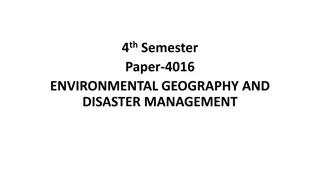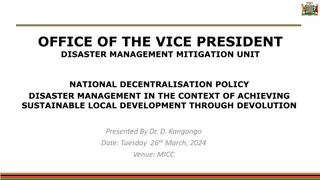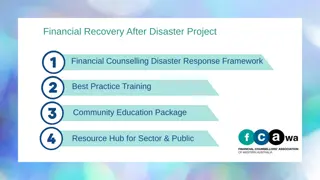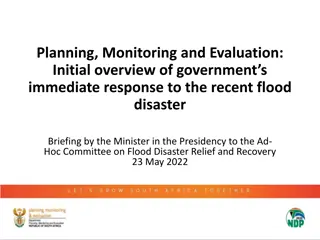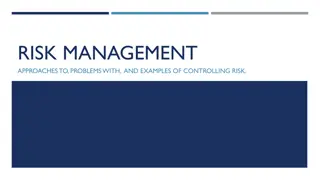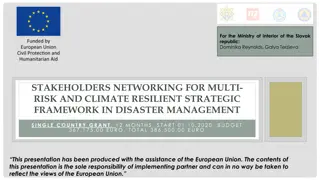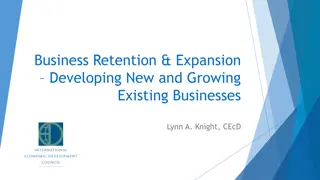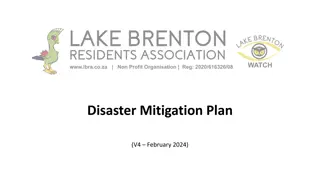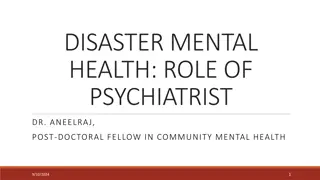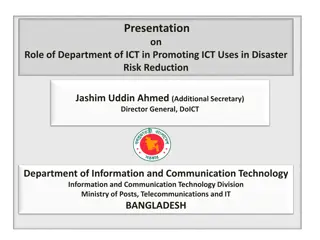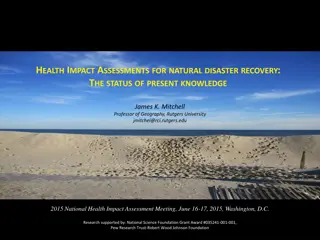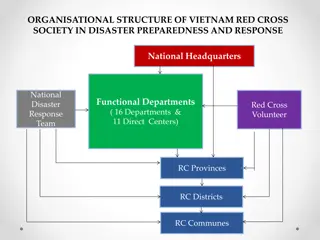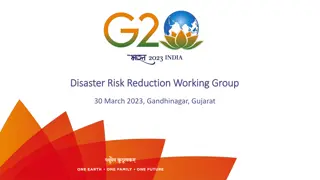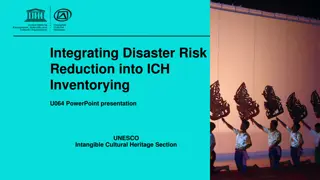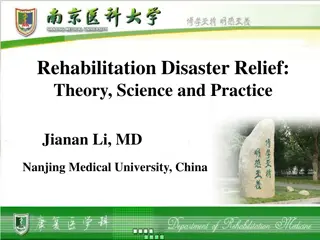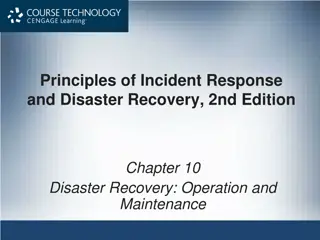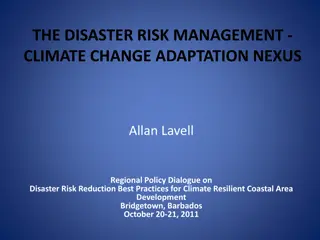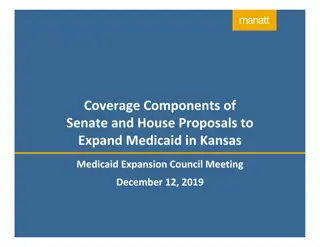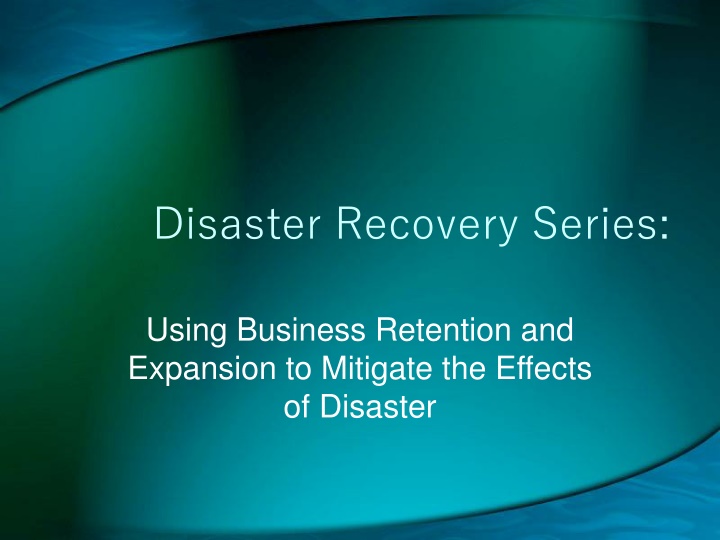
Mitigating Disaster Effects through Business Retention and Expansion
Learn how utilizing Business Retention and Expansion (BRE) strategies can help communities mitigate the effects of various types of disasters, including natural, man-made, technological, and economic crises. Discover the importance of building strong relationships, understanding challenges, developing resources, and enhancing communication for disaster preparedness. Engage both public and private sectors, involve local governments, and establish a Disaster Recovery Plan to ensure businesses are prepared before disaster strikes.
Download Presentation

Please find below an Image/Link to download the presentation.
The content on the website is provided AS IS for your information and personal use only. It may not be sold, licensed, or shared on other websites without obtaining consent from the author. If you encounter any issues during the download, it is possible that the publisher has removed the file from their server.
You are allowed to download the files provided on this website for personal or commercial use, subject to the condition that they are used lawfully. All files are the property of their respective owners.
The content on the website is provided AS IS for your information and personal use only. It may not be sold, licensed, or shared on other websites without obtaining consent from the author.
E N D
Presentation Transcript
Disaster Recovery Series: Using Business Retention and Expansion to Mitigate the Effects of Disaster
ARE YOU READY? Every Community Every Where Can have a disaster
WHAT IS A DISASTER Natural Disasters (Hurricanes, Floods, Wildfire, Earthquakes, Agricultural diseases, Winter and Ice Storms, Etc) Man-Made & Technological Disasters (Hazardous materials and chemicals, building fires, terrorism, cyber attacks, etc) Economic Disasters (Plant closures/relocations)
WHAT IS BRE Purpose To provide assistance with business challenges Prevent companies from relocating Building relationships
WHAT IS BRE? How is it accomplished? Personal visits Surveys Focus groups Door-to-door Other
WHAT IS BRE? End Result Strong relationships Clear understanding of challenges Development of resources Better communication Development of programs Trust
DISASTER PREPAREDNESS & BRE Requires engagement from both public and private sectors Local government has legal responsibility in Canada EDO acts as intermediary
BEFORE A DISASTER Develop a Disaster Recovery Plan Collect Critical Emergency Contact Information from Local Businesses Go beyond the basics Visitation Program Collect Cell Phone numbers (for primary and secondary contacts) Collect social media accounts as an alternate way to communicate/contact Can create an online registration system
BEFORE A DISASTER Store Data Remotely or in the Cloud You to can/will be impacted by the disaster Loss of data will greatly impact your ability to communicate Convene Local Banks to discuss Financing Options Government financing takes time A pre-established process to access financing before a disaster can help a business get back up in operation Include Banks in planning processes
BEFORE A DISASTER Prepare Media Messages and Communication Channels Why now? Breakdown in communication is one of the most difficult barriers Rumour and misinformation spread quickly Telecommunication and power outages may be widespread Manage perceptions of community Use social media for both internal and external Prepare for all types of possibilities May need to use pony express!
BEFORE A DISASTER Establish a Tiered System of Business Re-entry Critical step for allowing access to businesses to secure premises Allows a designated person(s) to get immediate or early access Allows for restocking in order to supply residents returning A Tiered System (Jefferson Parish) Primary infrastructure and major utilities, pre-designated government, contractors and suppliers of emergency relief goods and equipment Humanitarian relief agencies, disaster responses teams from large businesses essential to economy Return of business owners and key employees of business vital to return of citizens
BEFORE A DISASTER Business Continuity Planning EDO/Chamber should take a key role Businesses do not understand the need Hold workshops and/or webinars Develop Tools for Business
AFTER THE DISASTER Establish a Business Recovery Centre Meet pressing needs of the business community If possible separate from other recovery centres if combined, make sure there is a clear distinction between business and social
AFTER THE DISASTER Business Recovery Centre Gather resources for financial and technical assistance Identify physical location (easy to find) Include partners to help staff Hotline Market centre through traditional and grassroots Provide papers for different needs Train staff to be sensitive to mental health issues Prepare for long term
AFTER THE DISASTER Establish a Case Management Approach Assign trained staff to impacted business to provide individual assistance Some case managers can be non-impacted business owners Establish or Promote Financing Programs
AFTER THE DISASTER Communication and Outreach Program Provide sensitivity training for outreach personal Business Recovery Hotline Online Web Portal Outreach Campaign for Key Businesses
AFTER THE DISASTER Communication and Outreach Program Survey Local Businesses (even a Business Walks) Go above and beyond Meet face to face and/or in focus groups Primary focus is listening Outreach teams should meet regularly to discuss common themes and identify solutions Business Recovery Workshops To address common issues Update on community and external activities to assist business
THANK YOU Dale Wheeldon President & CEO British Columbia Economic Development Association E: dwheeldon@bceda.ca M: 1-(604)-819-3809


